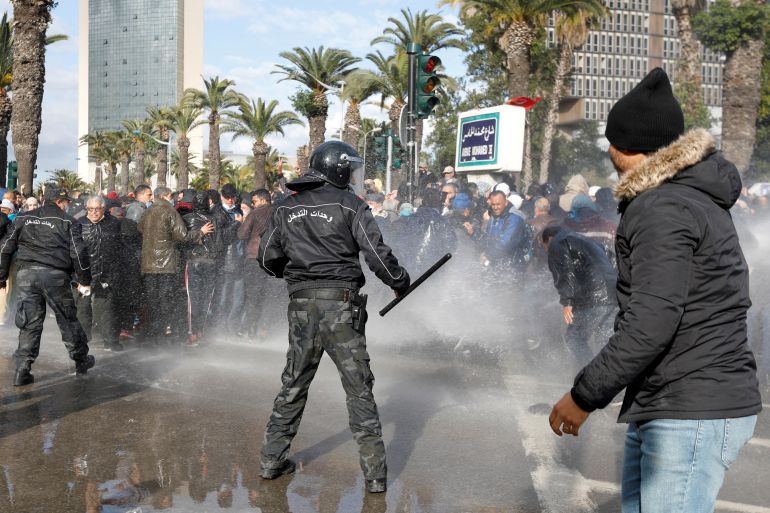Tunisian dies after protesting President Saied’s moves
Rhida Bouziane was among hundreds of demonstrators who commemorated the 11th anniversary of Tunisia’s revolution on Friday.

A Tunisian man has died of wounds he sustained during a crackdown by security forces on anti-government protesters during a demonstration last week.
Rhida Bouziane, 57, was critically wounded on Friday and died as a result of “excessive violence inflicted on the demonstrator”, the Citizens Against the Coup campaign said on Facebook.
Keep reading
list of 4 itemsWestern states ask Tunisia to return to ‘democratic institutions’
Tunisian man died from police violence at protest: Opposition
Tunisia police use water cannon to disperse protesters
President Kais Saied seized governing powers in late July in what opponents have described as “a coup against the constitution”. He has denied the coup allegations and promised to uphold rights and freedoms won in Tunisia’s 2011 revolution that triggered the Arab Spring uprisings across the region.
Bouziane was one of hundreds of demonstrators who marched on Friday in commemoration of the 11th anniversary of the Tunisian revolution. Friday’s protest was also against a government ban on all indoor or outdoor gatherings which was announced on Tuesday to stop a COVID-19 wave.
Samir Dilou, the former leader of the Ennahdha movement, the party with the largest number of seats in Tunisia’s suspended parliament, condemned Bouziane’s death on Wednesday.
“The deceased left his home on January 14 to participate in the commemoration of the revolution. He said good bye to his two daughters and son. They waited for him for five days, but he never returned. Today, they bid him farewell before he’s put to rest,” said Dilou.
The party called it “a murder” and alleged authorities “hid from his family that he was in intensive care for five days”.
Tunisia’s independent anti-torture body opened its own “suspicious death investigation”, Lofti Ezzedine, an official with the group, told AFP news agency.
A heavy police presence on Friday prevented the protesters from gathering on Habib Bourguiba Avenue, the main street in the centre of the capital that is the traditional focal point of demonstrations, including during the 2011 Tunisian uprising. Police dispersed demonstrators using tear gas and water cannon.
Ennahdha and other parties taking part in the protest accused the government of introducing the ban and resuming its night curfew for political rather than health reasons as a way of preventing demonstrations.
Friday fell on what Tunisians had previously marked as the anniversary of the 2011 revolution, the day longtime ruler Zine El Abidine Ben Ali fled the North African country.
However, Saied decreed last year that instead of falling on the anniversary of Ben Ali’s departure into exile, it would be marked on the December anniversary of the self-immolation of a street vendor, which triggered the uprising.
Civil society groups and Saied’s political opponents have warned of a return to authoritarianism. Some Tunisians, however, tired of the inept and corruption-ridden parliamentary system, have welcomed his moves.
Tunisia’s economy remains mired by the pandemic, there has been little progress in gaining international support for the fragile public finances, and the government Saied appointed in September has announced an unpopular budget for 2022.
The Tunisian president started preparing a new constitution that he said he will offer to a referendum in July.
The vote will take place following an online public consultation. Parliamentary elections are also expected to take place at the end of 2022.
More than 50,000 people have participated in Tunisia’s national consultation that will feed into the drafting of the new constitution, authorities said on Wednesday. The consultation will last until March 20. Topics include political, economic, financial, social, health, educational and cultural affairs.